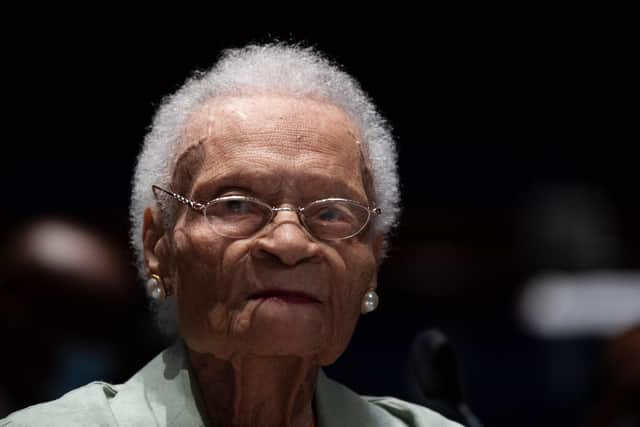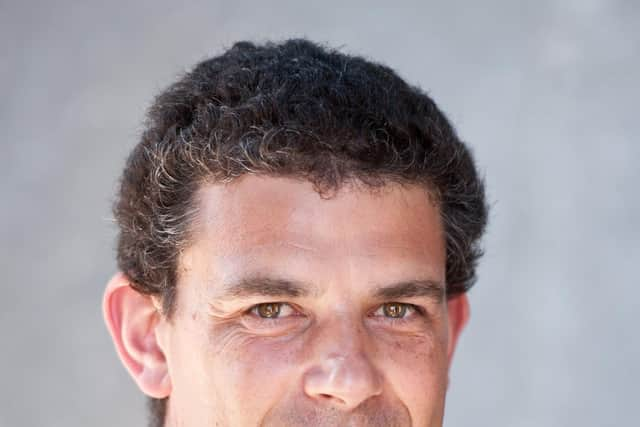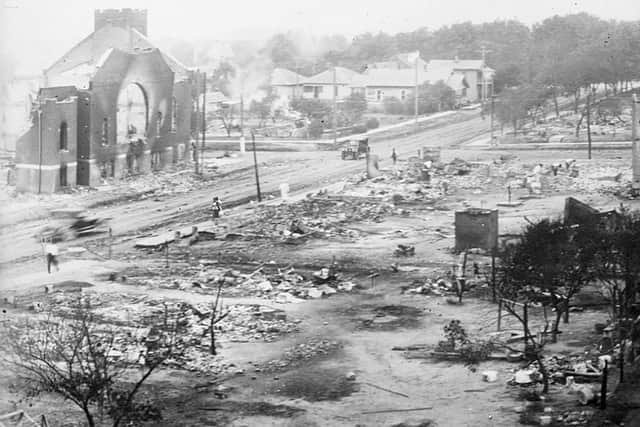Scots professor calls for justice over century-old race massacre
Eric Miller, from Glasgow, said that the emotional and economic scars from the 1921 Tulsa race massacre remain raw, with African Americans still suffering from the enduring trauma of the “systemic wrongdoing.”
The Scot, a leading expert in the intersection of race and US criminal law, warned that a “diaspora” of families driven out of their homes and communities had been denied justice for a century.
Advertisement
Hide AdAdvertisement
Hide AdHe gave evidence before a US House of Representatives committee alongside the last three living survivors of the massacre.
They included Viola Fletcher, who was aged seven when she, her parents, and five siblings fled the city in Oklahoma as white mobs embarked on a murderous rampage.
Now aged 107, she is demanding justice and a long overdue reckoning with one of the darkest chapters in American history.
“I still see black men being shot, black bodies lying in the street, I still smell smoke and see fire, and black businesses being burned,” she said.
“I hear the screams. I have lived through the massacre every day. Our country may forget this history, but I cannot. I will not.”


As many as 300 African Americans were killed and around 10,000 were left homeless after the mobs, aided and abetted by authorities, descended on the community of Greenwood, a prosperous African-American enclave known as ‘Black Wall Street’.
They shot black residents indiscriminately and burnt more than 1,200 homes to the ground, along with schools, churches, businesses, and a hospital. Those who survived were rounded up at gunpoint and placed in internment camps.
No one was ever prosecuted for their part in the massacre, and the victims and their descendants have never received any compensation.
Advertisement
Hide AdAdvertisement
Hide Ad

While 31 May will mark the centenary of the massacre, the truth of what happened that day in Tulsa continues to emerge grudgingly, having long been covered up by authorities.
Excavation work will begin next month in an area of a cemetery in the city where a mass grave was discovered last autumn. Archeologists and forensic anthropologists believe it could be linked to the atrocity.
In Miller’s view, redressing the incalculable harm suffered by black Tulsans must extend far beyond direct financial payments.
“They need transformational justice to remedy the systemic, ongoing wrongdoing still suffered by the victims, their descendants, and the current residents of the Greenwood and north Tulsa districts of the city,” he said.


“To provide an appropriate remedy, we must understand the nature and scope of the wrongdoing, and its impact on the victims. The massacre not only destroyed the Greenwood community, its infrastructure, and human and social capital - it created a diaspora of people driven from their homes, their families, and their support networks.”
Many of those who fled the massacre, Miller said, could not return to Tulsa, having been threatened with violence. Others lacked the means to rebuild their home, or were simply burdened with an “unbearable psychological trauma.”
Fletcher’s brother, Hughes Van Ellis, now 100, also testified before the House Committee on the Judiciary.
The veteran, who served in an all-black battalion during World War II, made a simple plea for Congress to act before it was too late.
Advertisement
Hide AdAdvertisement
Hide AdHe said: “We were made to feel that our struggles were unworthy of justice, that we were less valued than whites, that we weren’t fully American. We were shown that in the US, not all men were equal under law. We were shown that when black voices called out for justice, no one cared.”
“We are asking for justice for a lifetime of ongoing harm," he added. "Give us a chance to be made whole. Please do not let me leave this earth without justice."
While the issue of reparations has long been contentious in a country still coming to terms with its tormented racial history, the murder of George Floyd and the Black Lives Matter movement have shifted it towards the mainstream of US political discourse.
Miller, a professor at Loyola Law School in Los Angeles, California, has been a driving force behind that pursuit of restorative justice in the courts. He is part of a pioneering legal action against authorities in Tulsa for their involvement in the massacre.
His upbringing in Glasgow proved a significant, yet ignominious catalyst for his lifelong interest in racial justice.
As the grandson of a Jamaican migrant, he was faced with intolerance as a young, mixed-race Scot while at school at Glasgow Academy, and recalls seeing members of the National Front handing out leaflets in the city.
It was a visit to the Paperback Centre, a socialist bookshop in Hope Street, that changed the course of his life. There, he discovered a pamphlet of Malcolm X’s speeches, and realised there was “a framework for articulating black power as a legitimate demand.”
After graduating with first-class honours in law from the University of Edinburgh, he studied at Harvard Law School, and worked for Charles Ogletree Jr, an attorney and academic whose protegees include President Barack Obama.
Advertisement
Hide AdAdvertisement
Hide AdNow, he hopes that the likes of Fletcher, Van Elllis, and the myriad black families who saw their prospects destroyed the night the marauding mobs laid waste to Greenwood, can finally receive what they are owed.
“Repair requires rebuilding infrastructure, building hospitals and health centres, redirecting highways that split these communities,” he reasoned. “These are the engines of their economic, as well as human and social capital.
“It also requires addressing the trauma and hurt experienced by the diaspora of descendants that exists around the country and the world.
“The enduring trauma of the massacre marked the survivors and their descendants, and still does to this day. We need a remedy fit for this massive act of horror.”
